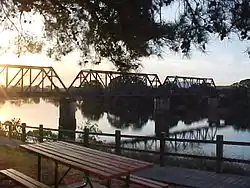Hastings River
Hastings River (Birpai: Doongang[1]), an open and trained intermediate wave dominated barrier estuary,[3] is located in the Northern Tablelands and Mid North Coast districts of New South Wales, Australia.
| Hastings River Mooraback Creek[1] | |
|---|---|
 North Coast railway bridge over the Hastings River at Wauchope | |
| Etymology | In honour of 1st Marquess of Hastings[1] |
| Native name | Doongang[1] |
| Location | |
| Country | Australia |
| State | New South Wales |
| IBRA | New England Tablelands, NSW North Coast |
| District | Northern Tablelands, Mid North Coast |
| local government area | Port Macquarie-Hastings |
| Physical characteristics | |
| Source | Great Dividing Range |
| • location | southwest of Kemps Pinnacle, within Oxley Wild Rivers National Park |
| • coordinates | 31°25′54″S 152°22′4″E |
| • elevation | 1,040 m (3,410 ft) |
| Mouth | Tasman Sea, South Pacific Ocean |
• location | Port Macquarie |
• coordinates | 31°25′48″S 152°55′12″E |
• elevation | 0 m (0 ft) |
| Length | 180 km (110 mi) |
| Basin size | 3,658 km2 (1,412 sq mi) |
| Basin features | |
| Tributaries | |
| • left | Forbes River, Pappinbarra River, Mortons Creek, Maria River |
| • right | Fenwicks Creek, Tobins River, Ralfes Creek, Ellenborough River Thone River |
| National Parks | Oxley Wild Rivers, Werrikimbe, Cottan-Bimbang |
| [2] | |
Course and features
Hastings River rises in the Great Dividing Range, southwest of Kemps Pinnacle, in the area surrounding Oxley Wild Rivers National Park and Werrikimbe National Park and flows generally south, southeast and east, joined by seven tributaries including the Tobins, Forbes, Ellenborough, Pappinbarra and Thone rivers, before reaching its mouth, flowing into the Tasman Sea of the South Pacific Ocean, at Port Macquarie. The river descends 1,040 metres (3,410 ft) over its 180 kilometres (110 mi) course.[2]
The course of the river flows adjacent to the settlements Ellenborough, Long Flat, Beechwood, Wauchope and Port Macquarie. The Oxley Highway is generally aligned with the middle and lower reaches of the river. West of Port Macquarie, the Pacific Highway crosses the Hastings River.
History
The Hastings River has been inhabited by Birpai Aboriginal people for thousands of years, who knew it as Doongang.
The river was first charted by European explorers in 1818, after being sighted by John Oxley. He named the river the Hastings River for the then Governor-General of India, Francis Rawdon-Hastings, 1st Marquess of Hastings.[1]
On 19 November 2002, two anglers found the dismembered body of murdered Sydney drug dealer, Terry Falconer. Investigations revealed that Falconer had died three days beforehand, after his corpse had been cut up and dumped in the Hastings River by Anthony Perish and his criminal gang associates.[4][5]
Recreation, flora and fauna
The Hastings River gives its name to the Hastings River wine region and to an endangered species of mammal, the Hastings River Mouse (Pseudomys oralis).
Fishing opportunities on the Hastings River exist for freshwater bass and catfish in the upper reaches to estuarine species such as bream, flathead and luderick near the river mouth.
See also
Gallery
.JPG.webp) Hastings River, flooded, west of Ellenborough, 2009.
Hastings River, flooded, west of Ellenborough, 2009. Dennis Bridge from the new Pacific Highway bridge to the west
Dennis Bridge from the new Pacific Highway bridge to the west New Hastings River Bridge carrying the Pacific Highway
New Hastings River Bridge carrying the Pacific Highway
References
- "Hastings River". Geographical Names Register (GNR) of NSW. Geographical Names Board of New South Wales. Retrieved 3 March 2013.

- "Map of Hastings River, NSW". Bonzle Digital Atlas of Australia. Retrieved 3 March 2013.
- Roy, P. S.; Williams, R. J.; Jones, A. R.; Yassini, I.; et al. (2001). "Structure and Function of South-east Australian Estuaries". Estuarine, Coastal and Shelf Science. 53: 351–384. doi:10.1006/ecss.2001.0796.
- Duffy, Michael (2012). Bad: the true story of the Perish brothers and Australia's biggest ever murder investigation (paperback). Crows Nest, NSW: Allen & Unwin. p. 290. ISBN 9781743312964.
- Robbo (13 August 2012). "Anthony Perish aka Badness". Aussie Criminals Blog. Archived from the original on 8 March 2013. Retrieved 3 March 2013.
External links
- "Camden Haven and Hastings River catchments". Office of Environment and Heritage (map). Government of New South Wales.